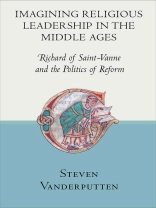Around the turn of the first millennium AD, there emerged in the former Carolingian Empire a generation of abbots that came to be remembered as one of the most influential in the history of Western monasticism. In this book Steven Vanderputten reevaluates the historical significance of this generation of monastic leaders through an in-depth study of one of its most prominent figures, Richard of Saint-Vanne. During his lifetime, Richard (d. 1046) served as abbot of numerous monasteries, which gained him a reputation as a highly successful administrator and reformer of monastic discipline. As Vanderputten shows, however, a more complex view of Richard’s career, spirituality, and motivations enables us to better evaluate his achievements as church leader and reformer.Vanderputten analyzes various accounts of Richard’s life, contemporary sources that are revealing of his worldview and self-conception, and the evidence relating to his actions as a monastic reformer and as a promoter of conversion. Richard himself conceived of his life as an evolving commentary on a wide range of issues relating to individual spirituality, monastic discipline, and religious leadership. This commentary, which combined highly conservative and revolutionary elements, reached far beyond the walls of the monastery and concerned many of the issues that would divide the church and its subjects in the later eleventh century.
Tabla de materias
Introduction1. Imagining Richard in Medieval and Modern Historiography2. Ecclesiastical Office, Religious Virtuosity, and the Apostolic Imperative3. Imagining Saint-Vanne4. ‘Founder and Head of Many Monasteries’5. Converting the World ConclusionAppendix A: Chronology of Major Events in Richard’s Life
Appendix B: The Life of Roding
Appendix C: Monastic Reading at Saint-Vanne
Appendix D: Overview of Richard’s Abbacies Outside of Saint-Vanne
Appendix E: Overview of Richard’s ‘Priors’
Appendix F: Overview of Richard’s SuccessorsBibliography
Index
Sobre el autor
Steven Vanderputten is Professor of Medieval History at Ghent University. He is the author of Monastic Reform as Process: Realities and Representations in Medieval Flanders, 900–1100, also from Cornell, editor of Understanding Monastic Practices of Oral Communication (Western Europe, Tenth–Thirteenth Centuries), and coeditor of Ecclesia in medio nationis: Reflections on the Study of Monasticism in the Central Middle Ages.












